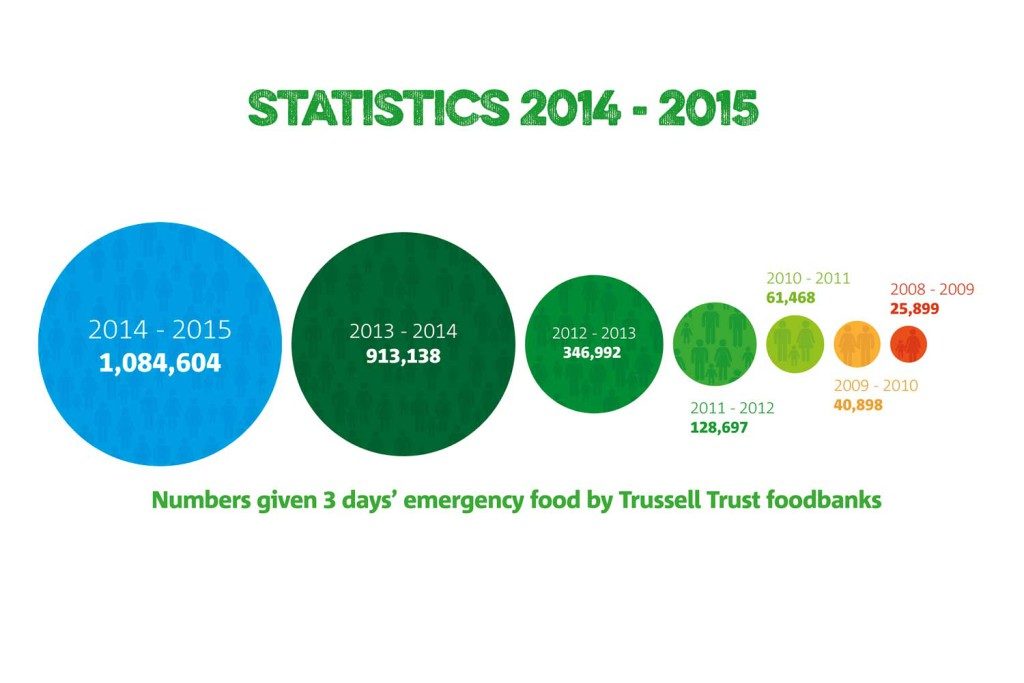As Rachael returns home from work, she opens the fridge to find half a bottle of milk, bacon, two steak pasties, three eggs and a loaf of bread to last her and her son three weeks. She also delves into her pockets to reach for money. She spreads it across the table in her temporary accommodation. ‘That’s all I have to my name’. It is just 14 pence. An occurrence which is becoming all too common.
The reality is that reports show a shocking 33% of British workers live paycheck to paycheck. For those who do not earn enough money to get by, the Government introduced Universal Credit to replace the benefit system.
Universal Credit helps to offset low wages for workers, but it has been blamed for the rise in Poverty and increased use of food banks. And it is easy to see why.
Introduced in 2010 by the Conservatives, Universal Credit was aimed to help those who were claiming different kinds of benefits and merge them into one. The claimants who are eligible will have the money sent to their bank account in one single payment. Those claiming Universal Credit then have to pay the landlord for rent and or other amenities.
The scheme was designed to make claiming benefits simpler, and since the introduction, there were 2.3 million Universal Credit claimants as of July 2019.
However, the problem with Universal Credit arises as soon as the claimant applies. Claimants have to wait 35 days before they receive their first payment. It takes four weeks to assess the previous months earnings and another week in order to process the payment, and this is where the problems begin, some argue it creates more problems than it solves.
This is echoed by Tracy Blick, Managing Coordinator for Christchurch (Dorset) food bank. She blamed the rise in use of food banks on the introduction and poor implementation of Universal Credit.
The sleepy Dorset town of Christchurch is situated along the English Channel and sandwiched between the town of Bournemouth and the New Forest. Christchurch also happens to have the largest Conservative majority in the country. MP Sir Christopher Chope won the previous election in 2017 by over 25,000 votes. It also has some of the highest levels of child-poverty in the South West of England.

She told me, the Government needs ‘to listen to those who work within the community and see the true facts and pay the Universal Credit the day they are assessed’.
She also hit out at the Government for not granting claimants money until the 5 week mark.
‘Universal Credit claims are not paid for five weeks, leaving families with no money’.
‘Our numbers in Christchurch have risen 31% on last year, and Universal Credit contributes to this.
‘We fed an extra 1020 people in the six week summer holidays, and expect to do the same over the 2 week-long Christmas holidays.’
‘We run out of most items in December and our shelves are empty in January, thank goodness we have such an amazing community donating generously otherwise I do not know what these families and individuals would do.’
But the people affected and caught up the Universal Credit system had then chance to bring about a change of Government. The 2019 General election saw the Conservatives win their biggest majority since the 1987.
Yet, shockingly, it was poorer areas such as Blackpool that the Tory’s were able to win seats in what were Labour heartlands because the party had ignored the leave-voting northern population, partnered with questions over Jeremy Corbyn. And as a result, the ‘red wall’ was broken down.
There are now more food banks in the UK than outlets of McDonald’s restaurants.
Ironically, Britain’s total wealth grew by 13% in the two years to 2018 to reach a record £14.6tn according to the Office for National Statistics. The report also showed that the wealthiest 10% in society ended 2018 with 45% of the national wealth, yet the poorest 10% held just 2% of the national wealth.
The Conservative Party do not have an entirely good record when it comes to food banks. The charity, the Trussell Trust released figures showing the number of emergency three-day food packages handed out over the previous 7 years until 2015.

Over a five year period between 2010-2015, over the Conservative and Liberal Democrat coalition Government, a total of 2,534,899 emergency three day food parcels were given out, and that number does not include independent food banks.
Additionally, during the 2019 election campaign, Tory candidate at the time, and now MP for Broxtowe in Nottingham, Darren Henry blamed the use of food banks on people who ‘struggle to manage their budget’. Many constituents vented their outrage calling him ‘out of touch’, however Mr Henry later defended his comments and was eventually elected to the House of Commons.
This is not an isolated incident. Former Brexit Secretary and now Foreign Secretary, Dominic Raab said those who use food banks ‘has a cash flow problem’. This comment also caused controversy among those who use food banks, some calling him ‘stupid’ and the comments ‘deeply offensive’.
The Labour Party’s manifesto pledged to halve the number of people using food banks within their first year in office. However, the Conservatives manifesto did not include any information regarding food banks to reduce use or a plan for the next five years of a Conservative Government.
During the 2019 election, some Food Banks were closed to become polling stations, cancelling food bank sessions. Food banks in Edinburgh and Cardiff were affected and other areas across the country, including Surrey.
Those in the constituencies affected, vented their frustration on social media.
However, Britain isn’t the only place that has seen an increase in the number of food banks over the past 20 years. On the continent, Germany has been coming to terms with the fact that it faces the same problem. In 1994, there was only one food bank in Germany, there are now 900. A 900% increase in just 25 years.
A worrying 1.5 Million Germans use food banks each week according to Charity Tafeln, with many more using independent food banks.
Germany is Europe’s richest country. Unsurprisingly, 17% of Germans are worried about poverty, up from 10% just a year ago. Although official unemployment figures are very low, more and more Germans are taking on low-paid part time and insecure jobs.
Whilst the new Conservative Government arrange the cabinet, and pass bills through the House of Commons that they were unable to do in the previous Parliament, the Government will be judged whether or not they are able to help people who need it most.
Even Prime Minister Boris Johnson admitted that Labour voters ‘lended‘ their vote to the Conservative Party. But they will be judged over the next five years. Whether or not they manage to improve the situation for thousands in poverty and those who use food banks will be very much under the most intense of scrutiny, and rightly so.
If you need help this Christmas, you can find your nearest Trussell Trust Food Bank here:
